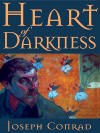
It Happened
in History!
(Go to
It Happened in History Archives)
|
Born in Berdichev, Poland—part of the Ukraine--on December 3, 1857, Joseph Conrad was the son of Apollo and Ewelina Korzeniowski, an impoverished but highly patriotic Polish noble family bearing the Nalecz coat-of-arms. His father was a writer of politically themed plays and a translator of the works of Victor Hugo, Charles Dickens, and Shakespeare from the French and English. He encouraged his son to read widely in Polish and French. As a result, young Korzeniowski enjoyed significant exposure to classic literature and the arts. In 1861, Conrad’s father was arrested by Imperial Russian authorities in Warsaw for helping to organize what would become known as the January Uprising of 1863–64. He was exiled to Vologda, 300 miles north of Moscow. Apollo’s wife and four-year-old son followed him. Due to Ewelina's failing health, Apollo was allowed to move to Chernihiv, Ukraine, where wıthin a few weeks his wife died of consumption, today known as tuberculosis. Apollo died four years later in Kraków, leaving young Conrad orphaned at the age of eleven. The boy was eventually placed in the care of his maternal uncle, Tadeusz Bobrowski. Although he attended school in Poland, Conrad had always dreamed of going to sea. Finally, at the age of 16, the multilingual young man traveled to Marseille, where he joined the French merchant marines and, while working on a ship, sailed to the West Indies where he became involved in the lucrative, if dangerous, activity of arms smuggling. Eventually, he left the French service and joined the British merchant navy, where he climbed quickly through the ranks. In 1886, he became a British citizen, officially changing his surname from Korzeniowski to Conrad, and received command of his own ship. Throughout his life at sea, Conrad saw parts of the world that most people only dreamt about. He visited Australia, various islands in the Indian Ocean and the South Pacific, and South America. In 1889, he traveled to Africa—which he had always wanted to see—where he became captain of a Congo River steamboat. One day, during one of his numerous journeys, one of his passengers--novelist John Galsworthy--heard about Conrad's writing and asked to see a sample. After reading a manuscript Conrad had been working on, Galsworthy encouraged him to attempt to get it published. The result was his very first work, Almayer's Folly.
In 1894, at the age of 36, Conrad decided to leave the sea behind him, and he settled in Kent, England, to concentrate on his new career as a writer. Two years later, he married an Englishwoman by the name of Jessie George, and they eventually had two sons.
Although physically ailing from a malady contracted while in Africa, Conrad continued his literary output with amazing grace and speed. Over the course of the next two decades, he produced a wide range of novels, all hanging upon the author’s suspect skepticism of the human condition. His influence as a writer did not go unnoticed. In 1924, British Prime Minister Ramsay MacDonald offered the author Knighthood, but Conrad courteously declined, calling himself “unworthy” of such an honor. Others, including friends and fellow authors John Galsworthy and H. G. Wells, disagreed. While in his later years he maintained a hectic schedule that included travels around the continent and a trip to the United States, Conrad continued his prolific literary output until his death, writing popular works such as Lord Jim (1900), Nostromo (1904), The Secret Agent (1907), The Arrow of Gold (1914), Victory (1915), The Shadow-Line (1917), The Rescue (1920), and The Rover (1923). He published his last work, The Nature of Crime, in 1924. Joseph Conrad died of a heart attack on August 3, 1924. Although he had remained a religious agnostic for most of his life, he received Roman Catholic services at St. Thomas church and was interred alongside his wife and lifelong companion, Jessie, in the Westgate Court Avenue public cemetery in Canterbury, England. His name is carved into the sprawling gravestone as it was given to him at birth: Joseph Teodor Konrad Korzeniowski. He was 67.
Discover Joseph Conrad
Indulge
Yourself - Check Out Today's Best-Selling |
- HOME -


